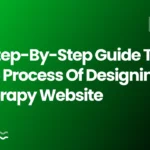In today’s digital landscape, therapists and mental health professionals must navigate the world of online marketing to reach potential clients and build their practice. With the increasing demand for mental health services, establishing a strong online presence is more important than ever. This introductory guide to online marketing for therapists will explore essential strategies, tools, and tips to help you effectively market your services and connect with those in need.
Understanding Online Marketing
Online marketing, also known as digital marketing, encompasses a wide range of activities aimed at promoting services and engaging with potential clients through digital channels. For therapists, it offers the opportunity to showcase their expertise, build trust with their audience, and increase their visibility in a competitive market.
Key Components of Online Marketing for Therapists
1. Website Development
Your website serves as the foundation of your online presence. It should be professional, easy to navigate, and informative, providing potential clients with everything they need to know about your services, qualifications, and how to get in touch. Ensure your site is optimized for search engines (SEO) to improve visibility.
2. Content Marketing
Content marketing involves creating and sharing valuable content to attract and engage your target audience. For therapists, this could include blog posts, articles, videos, and infographics on topics related to mental health and wellness. Quality content can position you as an authority in your field and help improve your SEO rankings.
3. Social Media Marketing
Social media platforms like Facebook, Instagram, Twitter, and LinkedIn are powerful tools for building relationships with potential clients. Share insights, tips, and updates about your practice to create a sense of community and accessibility around your brand.
4. Email Marketing
Email marketing allows you to communicate directly with potential and current clients. Use it to share news, content, and special offers, or to simply check in with those who have shown interest in your services. Personalized emails can significantly enhance client engagement and retention.
5. Online Advertising
Online advertising, including pay-per-click (PPC) ads, social media ads, and display ads, can help increase your visibility to a targeted audience. Platforms like Google Ads and Facebook Ads offer sophisticated targeting options to ensure your message reaches those most likely to be interested in your services.
Best Practices for Online Marketing
- Understand Your Audience: Knowing who you’re trying to reach is crucial. Define your target audience based on demographics, interests, and the specific mental health challenges they face.
- Be Authentic: Authenticity resonates with people. Share your experiences, insights, and the passion behind your work to connect with your audience on a personal level.
- Measure Your Results: Use analytics tools to track the performance of your marketing efforts. Understanding what works and what doesn’t allows you to adjust your strategy for better results.
- Stay Informed: Online marketing is ever-evolving. Stay up-to-date with the latest trends, tools, and practices to keep your marketing efforts effective and relevant.
Conclusion
Online marketing for therapists is not just about promoting services; it’s about connecting with individuals in need of support and offering them a path to wellness. By leveraging digital marketing strategies effectively, you can expand your reach, establish your reputation, and make a meaningful impact in the lives of those seeking mental health services. Are you ready to embark on your online marketing journey and make a difference in the world of mental health?

